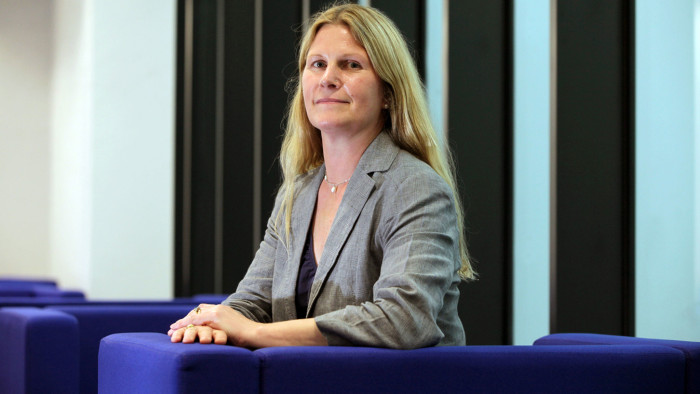Kathryn Haynes

Roula Khalaf, Editor of the FT, selects her favourite stories in this weekly newsletter.
Kathryn Haynes is professor of accounting and finance at Newcastle University Business School in the UK. She is also on the gender equality working group of the Principles for Responsible Management Education, a UN Global Compact-inspired initiative that aims to champion responsible management education, research and thought leadership. The specific focus of the working group is on integrating gender issues and awareness into education.
Prof Haynes studied for her PhD at The University of St Andrews School of Management in Scotland. Her first academic post was at the University of York, she then moved to Aston Business School before joining Newcastle. Before becoming an academic she trained as a chartered accountant and worked in an accounting practice for eight years.
In her spare time, Prof Haynes enjoys breeding and rearing poultry.
1. What academic achievement are you most proud of?
I am most proud of my PhD because I did it part-time while working full-time as a lecturer and raising two young children, which was a challenge. I am also proud of a two-year fellowship held with the Advanced Institute of Management Research, which enabled me to pursue my research agenda on gender issues in professional services, while engaging with academic peers and practitioners in the field of service.
2. Who are your research influences?
The work of the social theorist and philosopher Pierre Bourdieu has been influential in my research. His notions of the concept of different forms of capital, such as social, symbolic and cultural capital, help to explain how various practices, norms and embodied attributes become normalised in a particular social field and in social relations. These then support various groups in their influence and social position. Changing these social and cultural issues is what is so challenging.
3. What is an average day at work like?
My days are very varied: I have my own teaching [and research] commitments and I have several PhD students under my supervision, an aspect of the job I really enjoy. As head of the accounting and finance subject group, there is a management aspect to the role so I am involved in staff recruitment and supporting other colleagues in the group with their research or teaching.
4. What would you do if you were dean for the day?
I would get everyone together for a celebratory event, to enable people to talk informally and get to know each other better. This would also make people feel valued in the face of the pressures we all experience in higher education, from league tables, the Research Excellence Framework and growing workload.
5. What is the worst job you have ever had?
I loved aspects of working as an accountant and preparing accounts, but one of the issues I was uncomfortable with was trying to minimise the amount of tax clients had to pay. Often it seemed incongruous to me that our role was to support wealthy companies becoming even wealthier when there was so much inequality around. This was in the days before tax avoidance and the social justice of taxation was such a topical and controversial issue.
6. What advice would you give to women in business?
In the very busy lives we lead, it is sometimes easy to forget to invest in yourself, your development and your own progress, whether through additional qualifications, taking on new experiences and opportunities, or by seeking support when you need it. I think it is also important to put yourself forward for new challenges even if you don’t feel quite ready for them, because being out of a comfort zone is when we often seem to learn and develop the most.
7. How do you deal with male-dominated environments?
I try to act with integrity and awareness of the impacts of my actions on other people in any environment I am in and this does not change within male-dominated environments. When I worked as an accountant, it was pretty male dominated, especially at the higher levels of the companies. But there is no point trying to keep your head down, because if you are in the minority you will be noticed, so I just get on with the job conscientiously.
8. What is the last book you read?
I am currently reading Feminism Without Borders: Decolonizing Theory, Practising Solidarity by the feminist theorist Chandra Talpade Mohanty, which addresses the complexities of transnational feminism and the politics of difference and solidarity among women.
9. What is your favourite business book?
A book that resonated with me during my early research career is Feminist Research in Theory and Practice by Gayle Letherby, which gives an excellent overview of feminist theory but more importantly shows how this can be applied in a research context. It influenced me to think about the ethics of the research and how the process of research is ultimately related to the outcome.
10. What is your favourite memory of school?
I entered a scientific essay writing competition on the theme of “Time”, which was supposed to use scientific concepts and explanations, but I wrote a fantasy piece about infinity, which won! My English teacher Mrs Spence and I had a great day out in London at a prize-giving ceremony featuring the scientist Prof Heinz Wolff, who I think was a bit bemused by my essay.
Comments